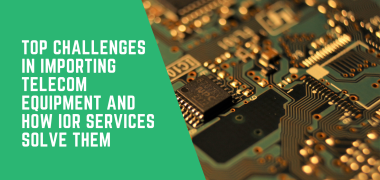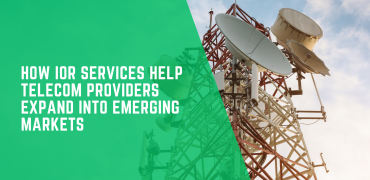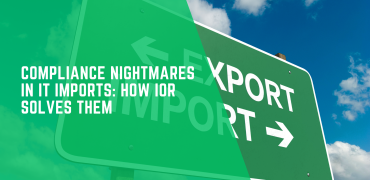The global telecom industry is rapidly expanding, driven by increasing connectivity demands, the rollout of 5G networks, and advancements in wireless communication. However, importing telecom equipment across international borders is a complex process fraught with regulatory, logistical, and technical challenges. For businesses venturing into new markets or scaling operations, these hurdles can cause delays, incur additional costs, and lead to compliance risks.
This is where Importer of Record (IOR) services step in. By managing regulatory requirements, documentation, and logistics, IOR services streamline the importation process, allowing telecom companies to focus on their core operations.
In this blog, we’ll explore the top challenges in importing telecom equipment and how IOR services effectively address them.
1. Navigating Complex Regulatory Requirements
Challenge:
Telecom equipment often falls under strict regulatory scrutiny due to its role in critical infrastructure and potential security risks. Importing such equipment requires adherence to:
- National Import Laws: Varying customs procedures and standards.
- Telecommunication Regulatory Approvals: Compliance with technical standards for frequency, safety, and emissions.
- Licensing Requirements: Specific licenses or certifications needed for certain equipment.
Failure to meet these requirements can result in shipment holds, fines, or outright rejections.
How IOR Services Help:
IOR providers act as the legal entity responsible for compliance in the importing country. They:
- Obtain Necessary Licenses: Secure certifications and approvals from telecom regulatory bodies.
- Ensure Standards Compliance: Verify that the equipment meets local technical standards.
- Stay Updated on Regulations: Monitor changes in import laws and ensure adherence to new policies.
Example: A telecom company importing network routers into the EU uses an IOR service to navigate stringent CE marking requirements, ensuring smooth customs clearance.
2. Managing Customs Clearance and Duties
Challenge:
Customs clearance is often delayed due to incomplete documentation, incorrect tariff classifications, or mismanagement of duties and taxes. For telecom equipment, additional scrutiny may apply, given its strategic importance.
How IOR Services Help:
- Documentation Management: IOR providers prepare and submit all necessary paperwork, including commercial invoices, packing lists, and bills of lading.
- Accurate Tariff Classification: They classify telecom equipment under the correct HS (Harmonized System) codes, ensuring accurate duty calculations.
- Duty and Tax Payment: IOR services handle the payment of customs duties and taxes, avoiding penalties or delays.
Example: A telecom operator importing base station equipment into a high-duty country avoids costly misclassification penalties by leveraging an IOR’s expertise.
3. Handling Restricted or Controlled Items
Challenge:
Many countries classify telecom equipment as restricted or controlled items due to potential dual-use applications or security concerns. Importing such equipment requires additional permits and thorough documentation.
How IOR Services Help:
- Obtain Special Permits: IOR providers secure the necessary permits for restricted items.
- Comply with Security Protocols: Ensure adherence to government protocols for controlled imports.
- Facilitate End-Use Certification: Provide or assist in obtaining end-user certificates to satisfy export and import regulations.
Example: A telecom company importing encryption-enabled devices into India meets strict security clearance requirements with the help of an IOR.
4. Coordinating International Logistics
Challenge:
Telecom equipment often involves bulky or sensitive items requiring specialized handling. Coordinating shipments across multiple carriers and regions adds complexity to logistics.
How IOR Services Help:
- End-to-End Coordination: IORs manage every aspect of logistics, from pickup to delivery.
- Specialized Handling: Arrange for temperature-controlled, shock-proof, or secure transportation as required.
- Real-Time Tracking: Provide visibility into shipment status through advanced tracking tools.
Example: A telecom provider uses an IOR to transport sensitive fiber-optic cables, ensuring they arrive undamaged and on time.
5. Adhering to Country-Specific Trade Restrictions
Challenge:
Certain countries impose trade restrictions, embargoes, or sanctions on specific equipment, vendors, or regions. Navigating these restrictions is critical to avoid legal and financial repercussions.
How IOR Services Help:
- Conduct Trade Compliance Checks: Ensure that the equipment and suppliers meet all trade compliance requirements.
- Screen Against Sanctions Lists: Verify that transactions do not violate export or import restrictions.
- Advise on Alternative Solutions: Recommend compliant sourcing or routing strategies if restrictions apply.
Example: An IOR helps a telecom company import equipment from a restricted vendor by identifying alternate routing options and ensuring compliance with local trade laws.
6. Managing Import Taxes and VAT
Challenge:
Importing telecom equipment often involves substantial import taxes, value-added taxes (VAT), and other fees. Mismanagement can result in financial losses or disputes with tax authorities.
How IOR Services Help:
- Tax Calculation: Accurately calculate and pay applicable taxes, ensuring transparency.
- VAT Reclaim Assistance: Help recover eligible VAT payments in applicable regions.
- Compliance with Tax Laws: Ensure proper documentation and reporting for tax authorities.
Example: A telecom operator importing 5G antennas into the UK recovers input VAT with the help of an IOR, reducing overall costs.
7. Ensuring Timely Delivery
Challenge:
Delays in importing telecom equipment can disrupt project timelines, causing financial losses and customer dissatisfaction.
How IOR Services Help:
- Streamlined Processes: Leverage established relationships with customs authorities to expedite clearance.
- Contingency Planning: Prepare for potential disruptions by arranging alternative solutions in advance.
- Proactive Communication: Provide regular updates on shipment status to avoid surprises.
Example: A telecom company partners with an IOR to expedite the delivery of critical tower components during a 5G rollout.
8. Mitigating Risk of Damage or Loss
Challenge:
Telecom equipment is often expensive and sensitive, making it vulnerable to damage or loss during transit.
How IOR Services Help:
- Insurance Coverage: Arrange comprehensive insurance policies to cover potential risks.
- Specialized Packing Solutions: Ensure that equipment is packed securely for international transport.
- Claims Management: Handle claims efficiently in case of damage or loss.
Example: An IOR protects a telecom company’s investment in satellite communication equipment by securing end-to-end insurance coverage.
9. Case Study: IOR Services Enabling Telecom Expansion
The Challenge:
A U.S.-based telecom company sought to expand operations into Southeast Asia but faced challenges with:
- Navigating complex regulatory environments in multiple countries.
- Coordinating shipments of large-scale telecom equipment.
- Managing tax and duty requirements in diverse jurisdictions.
The Solution:
The company partnered with an experienced IOR provider, which:
- Secured all necessary regulatory approvals and licenses.
- Coordinated international logistics with specialized handling.
- Ensured compliance with local tax and customs laws.
The Results:
- Reduced project delays by 30%.
- Achieved 100% compliance with import regulations.
- Lowered overall import costs by leveraging tax optimization strategies.
10. The Future of IOR Services in Telecom Imports
As telecom technology evolves, importing advanced equipment like 5G towers, IoT devices, and edge computing hardware will become even more complex. IOR services will adapt to address emerging challenges, including:
- Facilitating Green Telecom Equipment: Supporting imports of sustainable, energy-efficient hardware.
- Navigating New Regulations: Ensuring compliance with stricter cybersecurity and privacy standards.
- Leveraging Technology: Using AI and blockchain for improved tracking, compliance, and transparency.
Conclusion
Importing telecom equipment is a multifaceted process that requires meticulous planning, expert knowledge, and seamless execution. From regulatory hurdles to logistical complexities, the challenges can be daunting without the right support.
IOR services provide a reliable solution, ensuring compliance, reducing costs, and mitigating risks at every stage of the importation process. By partnering with an experienced IOR provider, telecom companies can focus on their core mission of connecting the world while leaving the complexities of international trade to the experts.
In an industry where precision and speed are paramount, IOR services are indispensable for navigating the global logistics landscape with confidence.




